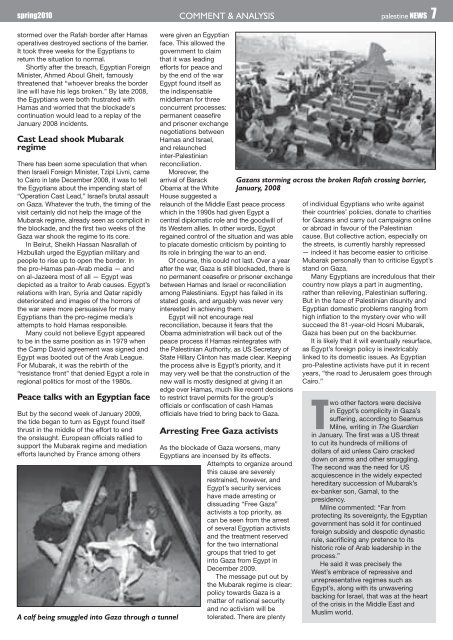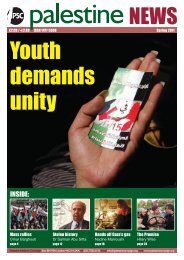INSIDE: - Palestine Solidarity Campaign
INSIDE: - Palestine Solidarity Campaign
INSIDE: - Palestine Solidarity Campaign
Create successful ePaper yourself
Turn your PDF publications into a flip-book with our unique Google optimized e-Paper software.
spring2010<br />
COMMENT & ANALYSIS<br />
palestine NEWS 7<br />
stormed over the Rafah border after Hamas<br />
operatives destroyed sections of the barrier.<br />
It took three weeks for the Egyptians to<br />
return the situation to normal.<br />
Shortly after the breach, Egyptian Foreign<br />
Minister, Ahmed Aboul Gheit, famously<br />
threatened that “whoever breaks the border<br />
line will have his legs broken.” By late 2008,<br />
the Egyptians were both frustrated with<br />
Hamas and worried that the blockade's<br />
continuation would lead to a replay of the<br />
January 2008 incidents.<br />
Cast Lead shook Mubarak<br />
regime<br />
There has been some speculation that when<br />
then Israeli Foreign Minister, Tzipi Livni, came<br />
to Cairo in late December 2008, it was to tell<br />
the Egyptians about the impending start of<br />
“Operation Cast Lead,” Israel’s brutal assault<br />
on Gaza. Whatever the truth, the timing of the<br />
visit certainly did not help the image of the<br />
Mubarak regime, already seen as complicit in<br />
the blockade, and the first two weeks of the<br />
Gaza war shook the regime to its core.<br />
In Beirut, Sheikh Hassan Nasrallah of<br />
Hizbullah urged the Egyptian military and<br />
people to rise up to open the border. In<br />
the pro-Hamas pan-Arab media — and<br />
on al-Jazeera most of all — Egypt was<br />
depicted as a traitor to Arab causes. Egypt’s<br />
relations with Iran, Syria and Qatar rapidly<br />
deteriorated and images of the horrors of<br />
the war were more persuasive for many<br />
Egyptians than the pro-regime media’s<br />
attempts to hold Hamas responsible.<br />
Many could not believe Egypt appeared<br />
to be in the same position as in 1979 when<br />
the Camp David agreement was signed and<br />
Egypt was booted out of the Arab League.<br />
For Mubarak, it was the rebirth of the<br />
“resistance front” that denied Egypt a role in<br />
regional politics for most of the 1980s.<br />
Peace talks with an Egyptian face<br />
But by the second week of January 2009,<br />
the tide began to turn as Egypt found itself<br />
thrust in the middle of the effort to end<br />
the onslaught. European officials rallied to<br />
support the Mubarak regime and mediation<br />
efforts launched by France among others<br />
A calf being smuggled into Gaza through a tunnel<br />
were given an Egyptian<br />
face. This allowed the<br />
government to claim<br />
that it was leading<br />
efforts for peace and<br />
by the end of the war<br />
Egypt found itself as<br />
the indispensable<br />
middleman for three<br />
concurrent processes:<br />
permanent ceasefire<br />
and prisoner exchange<br />
negotiations between<br />
Hamas and Israel,<br />
and relaunched<br />
inter-Palestinian<br />
reconciliation.<br />
Moreover, the<br />
arrival of Barack<br />
Obama at the White<br />
House suggested a<br />
relaunch of the Middle East peace process<br />
which in the 1990s had given Egypt a<br />
central diplomatic role and the goodwill of<br />
its Western allies. In other words, Egypt<br />
regained control of the situation and was able<br />
to placate domestic criticism by pointing to<br />
its role in bringing the war to an end.<br />
Of course, this could not last. Over a year<br />
after the war, Gaza is still blockaded, there is<br />
no permanent ceasefire or prisoner exchange<br />
between Hamas and Israel or reconciliation<br />
among Palestinians. Egypt has failed in its<br />
stated goals, and arguably was never very<br />
interested in achieving them.<br />
Egypt will not encourage real<br />
reconciliation, because it fears that the<br />
Obama administration will back out of the<br />
peace process if Hamas reintegrates with<br />
the Palestinian Authority, as US Secretary of<br />
State Hillary Clinton has made clear. Keeping<br />
the process alive is Egypt’s priority, and it<br />
may very well be that the construction of the<br />
new wall is mostly designed at giving it an<br />
edge over Hamas, much like recent decisions<br />
to restrict travel permits for the group’s<br />
officials or confiscation of cash Hamas<br />
officials have tried to bring back to Gaza.<br />
Arresting Free Gaza activists<br />
As the blockade of Gaza worsens, many<br />
Egyptians are incensed by its effects.<br />
Attempts to organize around<br />
this cause are severely<br />
restrained, however, and<br />
Egypt’s security services<br />
have made arresting or<br />
dissuading “Free Gaza”<br />
activists a top priority, as<br />
can be seen from the arrest<br />
of several Egyptian activists<br />
and the treatment reserved<br />
for the two international<br />
groups that tried to get<br />
into Gaza from Egypt in<br />
December 2009.<br />
The message put out by<br />
the Mubarak regime is clear:<br />
policy towards Gaza is a<br />
matter of national security<br />
and no activism will be<br />
tolerated. There are plenty<br />
Gazans storming across the broken Rafah crossing barrier,<br />
January, 2008<br />
of individual Egyptians who write against<br />
their countries’ policies, donate to charities<br />
for Gazans and carry out campaigns online<br />
or abroad in favour of the Palestinian<br />
cause. But collective action, especially on<br />
the streets, is currently harshly repressed<br />
— indeed it has become easier to criticise<br />
Mubarak personally than to criticise Egypt’s<br />
stand on Gaza.<br />
Many Egyptians are incredulous that their<br />
country now plays a part in augmenting,<br />
rather than relieving, Palestinian suffering.<br />
But in the face of Palestinian disunity and<br />
Egyptian domestic problems ranging from<br />
high inflation to the mystery over who will<br />
succeed the 81-year-old Hosni Mubarak,<br />
Gaza has been put on the backburner.<br />
It is likely that it will eventually resurface,<br />
as Egypt’s foreign policy is inextricably<br />
linked to its domestic issues. As Egyptian<br />
pro-<strong>Palestine</strong> activists have put it in recent<br />
years, “the road to Jerusalem goes through<br />
Cairo.”<br />
Two other factors were decisive<br />
in Egypt’s complicity in Gaza’s<br />
suffering, according to Seamus<br />
Milne, writing in The Guardian<br />
in January. The first was a US threat<br />
to cut its hundreds of millions of<br />
dollars of aid unless Cairo cracked<br />
down on arms and other smuggling.<br />
The second was the need for US<br />
acquiescence in the widely expected<br />
hereditary succession of Mubarak’s<br />
ex-banker son, Gamal, to the<br />
presidency.<br />
Milne commented: “Far from<br />
protecting its sovereignty, the Egyptian<br />
government has sold it for continued<br />
foreign subsidy and despotic dynastic<br />
rule, sacrificing any pretence to its<br />
historic role of Arab leadership in the<br />
process.”<br />
He said it was precisely the<br />
West’s embrace of repressive and<br />
unrepresentative regimes such as<br />
Egypt’s, along with its unwavering<br />
backing for Israel, that was at the heart<br />
of the crisis in the Middle East and<br />
Muslim world.







